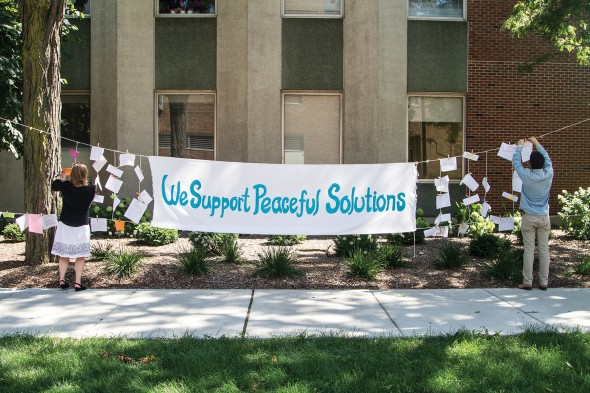East Meets West: Standing together for peace

Campus partners from across UIC gathered to urge peaceful solutions to curbing gun violence during the Letters for Peace event. (Photo: Vibhu S. Rangavasan)
Folded paper cranes were hung outside the College of Nursing, alongside letters pinned to the same rope line. Graduate student Jaclyn Camardo read aloud the story of one participant, who, at 15 years old, lost their grandmother to gun violence. She was shot by her son.
“People who shoot their mothers don’t get life in prison,” read the letter, which advocated for stricter gun reform laws. “People who shoot their mothers have incredible power over this world, and I feel so powerless.”
Camardo, a nursing student, said hearing such stories of helplessness wasn’t uncommon in her community health rotations this summer. She saw how violence affected her patients first-hand.
“A lot of our patients were scared for their own safety — seeing even a mass shooting can affect the lives of people here, and for our patients, [violence] is really at their front doorsteps on a daily basis,” she said.
So Camardo, along with five other nursing students, campus partners from the east and west sides and from off-campus groups — such as Emergency USA in Chicago, an organization that provides health care for victims of war, poverty and natural disasters — hosted the Letters for Peace event July 25.
“They wanted to say, ‘This is our issue, our problem,’” said the students’ instructor, Geraldine Gorman, clinical associate professor of health systems science. “Violence is not an isolated issue, it’s a public health epidemic.”
“We wanted people to connect with each other’s stories and see the real impacts of gun violence, to really stand together as representation for better gun control and end the violence in communities all across our representation,” added Moses Timlin, a master’s candidate in the College of Urban Planning and Public Affairs. Moses attended the event as a representative from CUPPA’s Center for Public Safety and Justice.
About 100 letters written for the event were sent to Illinois legislators.
“We wanted to show that, collectively, we address this gun violence as a public health epidemic that affects physical and mental health, and that’s affecting and destroying communities,” added Camardo.
The conversations that took place in the safe space pulled people together for long-term change and peaceful solutions.
“I am behind this movement,” said Marcus McAllister, a community affairs specialist for Cure Violence, an organization founded by a UIC professor of epidemiology in the School of Public Health. Cure Violence reduces violence by treating it with the same model that’s used for epidemic disease outbreaks.
“But beyond dealing with gun laws and shops, we have to deal with communities.”
McAllister said he was incarcerated for 10 years, but turned his life around.
“I’ve been one of the perpetrators of violence, but, today, having been part of that bad situation allows me to change somebody going down that path,” he said. “So make sure that, just as much as you write letters, you talk.”
The event was a “stage and opportunity” at the grassroots level for people to “be about the change that they want to see,” added Jose Abonce, a CUPPA master’s student and research assistant at the Center for Public Safety and Justice.
“And we came out of it with the understanding that our fields and both of our interests can help inform the inequities that we’re trying to combat.”
It’s just the beginning of partnerships between nursing and urban planning students that will focus on social justice initiatives.
“We have to keep going,” Camardo said.
To follow the letters or for updates, visit the Letters for Peace Facebook page.
